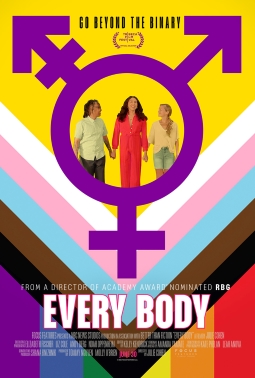There are even more movies to watch in July than there were in June, so here we are again, with a plethora of film reviews. To kick things off, I give you two stellar documentaries that are sure to broaden your horizons and remind you of the ongoing injustices many people face in our world. They pack an emotional wallop and provide an incredible education in 90 minutes that will stick with you for a good long while after you leave the theater.
Every Body: Directed by Julie Cohen, this film is a wonderful portrait of three intersex people, Sean Saifa Wall, Alicia Roth Weigel, and River Gallo, and their experiences of growing up intersex in different parts of the United States. As they share their stories with the documentary crew, we also get a history of how intersex people have been treated in the past, and the work of Dr. John Money, a man who pioneered the surgical and medical care given to such people from birth, and who is responsible for the dangerous ideology and misinformation that is still quoted in medical textbooks and spread in the medical community today.Intersex people are born with any combination of sex characteristics that don't fit our binary model of male or female bodies. For example, you could have a vulva and a vagina, and externally present as female, but internally you could have testes, with no ovaries or uterus. Historically, doctors would assign a gender to the intersex baby, and perform invasive surgeries or medical procedures as an infant as well as when the child entered puberty to ensure they "conformed" to their assigned gender. Which of course doesn't take into consideration what the child wants, and what gender they feel is right for them. And the entire thing was shrouded in secrecy, with parents often being told never to talk to anyone about this, and the patients often even keeping medical practices secret from their parents.
It's all very horrifying and sad, but the three wonderful people at the heart of this documentary are now incredible activists, fighting to give intersex people more visibility, leading protests, and actively trying to persuade lawmakers to change laws to ensure intersex people have more rights and agency. A startling fact that Alicia notes is how anti-trans bills are often about how trans people should not have the right to get surgeries or take hormones to makes their bodies align to their chosen gender identity, but at the same time, those same bigoted lawmakers are desperately pushing bills demanding intersex surgery and hormone therapy be performed on infants and children so they would be forced to adopt a gender that may not reflect their true identity. I know it all sounds very heavy, but I promise this is also an inspirational film that showcases the improvements in recent years to treat intersex individuals with more compassion, and ultimately ends on a note of joyous positivity. There is much work to be done, but perhaps you can begin by educating yourself with this movie.
Black Ice: I do not watch ice hockey, but I certainly watched the hell out of this documentary. A comprehensive look at the racism directed towards hockey players in Canada, it is a wondrous history lesson about the contributions of Black people to the sport of ice hockey, as well as an infuriating reminder of the many barriers to entry they currently face at all levels of the sport. It also offers up a fascinating insight into Canadians and their view that they are not racist - that's viewed as an American problem, but as this film proceeds to demonstrate, Canada is no multicultural paradise.Directed by Hubert Davis, over the course of the film we learn about the Coloured Hockey League in Nova Scotia, which was an all-Black hockey league where many innovations that are commonplace in the sport today were first seen. These players were great athletes who simply wanted to play the sport they loved, but any attempts to integrate them into the National Hockey League were denied and there were so many socioeconomic factors that consistently kept them down. As is true of the history of so many sports, there were some pioneers who broke that color barrier, and this documentary tells their stories as well, featuring Willie O'Ree, who was the first Black man to play in the NHL.
In addition to the historical perspective, however, this movie is urgently driven by interviews with current hockey players and their many tales of the systemic racism they have encountered beginning as young children and all the way into the NHL. The running theme with all these stories is how isolating and startling these experiences can be - they were usually the only people of color in their entire team, and it is particularly disheartening to hear them say that this abuse was often coming from adults and they had no idea what to do as children. Hearing a player talk about playing in a junior league and walking past parents hurling racist abuse at him is beyond the pale, but alas, that is the world we live in. As distressing as this documentary is though, it also offers up many uplifting examples of diversity initiatives that these folks are now running to ensure that young kinds of color can play hockey with their peers and have a safe space to hone their skills and gain mastery of the game. This film is a searing indictment of the NHL's pitiful attempts to diversify hockey, but at a grassroots level, it offers up a lot of hope that perhaps these new leaders in the sport, who already went through their share of horrors, will help create a better world for future players.


No comments:
Post a Comment